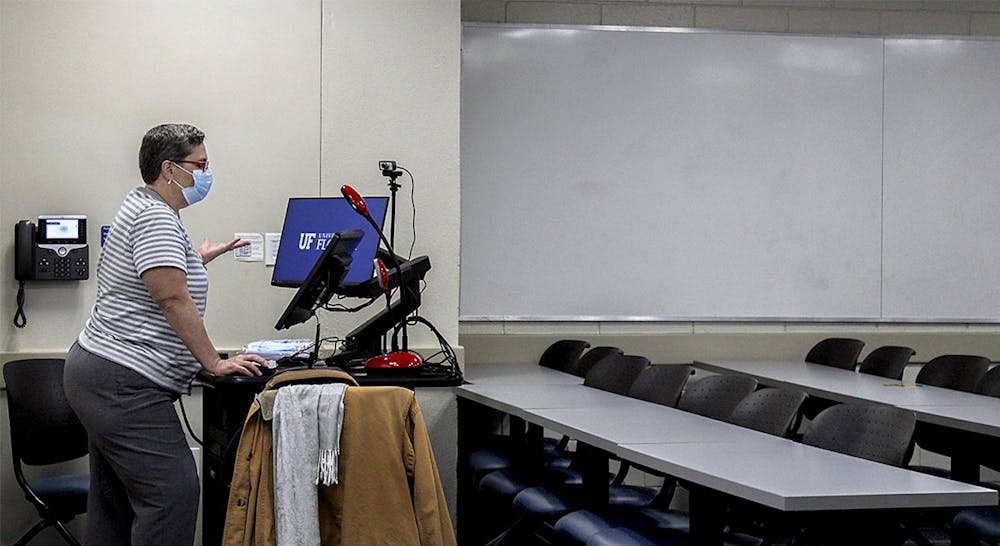Between lesson plans, new technology and added pressure from UF students and administrators, instructors are stretched thin.
As the first week came to a close, UF instructors reflected on the start of the semester with the most in-person classes since Spring 2020. They were asked to shift gears from teaching entirely online to HyFlex classes. Some found the transition on top of preparing their usual material as added pressure amid the already-stressful pandemic.
Kylie Williamson, a UF doctoral student in bioarchaeology and the instructor of an introductory public speaking course, began teaching HyFlex classes Jan. 13. She encountered problems balancing her attention between in-person and online students.
Williamson was concerned online students may feel neglected during classes, especially since they cannot see or hear the in-person students.
“Last semester we were all online, all on Zoom, but at least we were on the same playing field,” she said.
Williamson also had trouble with managing the new technology of HyFlex classes.
“It’s just this added layer of unnecessary stress,” she said. “It's the fear of the technology not working, students not being able to hear me.”
As the director of graduate student teaching, Anastasia Ulanowicz has observed how graduate students like Williamson adapted to simultaneously teaching online classes and doing personal research since last Fall. She was impressed with their adjustments to remote teaching but said the shift to hybrid and in-person teaching ignored these adjustments by introducing a different system.
“The graduate students are very, very concerned and very afraid,” she said.
Graduate student teachers are also concerned about their health. Many have to ride on public transportation, where they could potentially contract the virus, to get to campus, Ulanowicz said. Others have at-risk loved ones to care for and were refused Americans with Disabilities Act accommodations. Some are even international students who have shared their fears with Ulanowicz.
“They’ve told me that they’re afraid of falling ill and dying thousands of miles away from home,” she said.
These concerns are among the reasons why the United Faculty of Florida-UF, UF’s faculty union, has fought the return to in-person classes.
UFF-UF’s published an official report against the Spring 2021 Face-to-Face Teaching Mandate and the rejection of ADA accommodations. The report states 65% of ADA requests were denied to faculty who applied for accommodations, many of whom have conditions that place them at a higher risk for COVID-19.
The announcement of an addition to the GatorSAFE app garnered even more backlash from UFF-UF. GatorSAFE provides tools to help keep members of the Gainesville community safe, and the addition allowed students to report instructors if students feel there are inconsistencies between in-person and online teaching.
UFF pushed back against this addition because of its potential to violate the contract between UF and the faculty union. GAU-UF, UF’s chapter of Graduate Assistant United, also protested the addition. UF has since removed the addition’s drop-down menu and changed its purpose description, but the option to report inconsistencies in teaching to the university remains.
Despite concerns raised by the return to in-person classes, some instructors are glad they’ve been given the opportunity to teach in person.
For Angela Decarlis, a UF graduate student in painting and drawing, it is important the figure drawing class they teach remains in-person.
“A lot of people don’t realize that the skill of translating a 3D human form to 2D is different than it would be if we were learning from screens,” they said.
Accommodating Decarlis’s disability, social distancing policies and the course’s curriculum has split the class between two classrooms of six students each. Although their disability doesn’t put them at a greater risk for COVID-19, they wrote there are instructors in their department also teaching in person who are immunocompromised.
By seating students in two separate classrooms and having a work study student in class on days when figure models are present, Decarlis was able to continue teaching in -person.
“There are plenty of educators right now who are teaching the classes I am teaching online,” Decarlis said. “I am grateful to not be one of those teachers.”
Contact Sofia Echeverry at secheverry@alligator.org. Follow her on Twitter @sofecheverry.

Sofia is a news assistant on The Alligator's university desk. This is her second semester at paper, where she previously worked as a translator for El Caimán.






